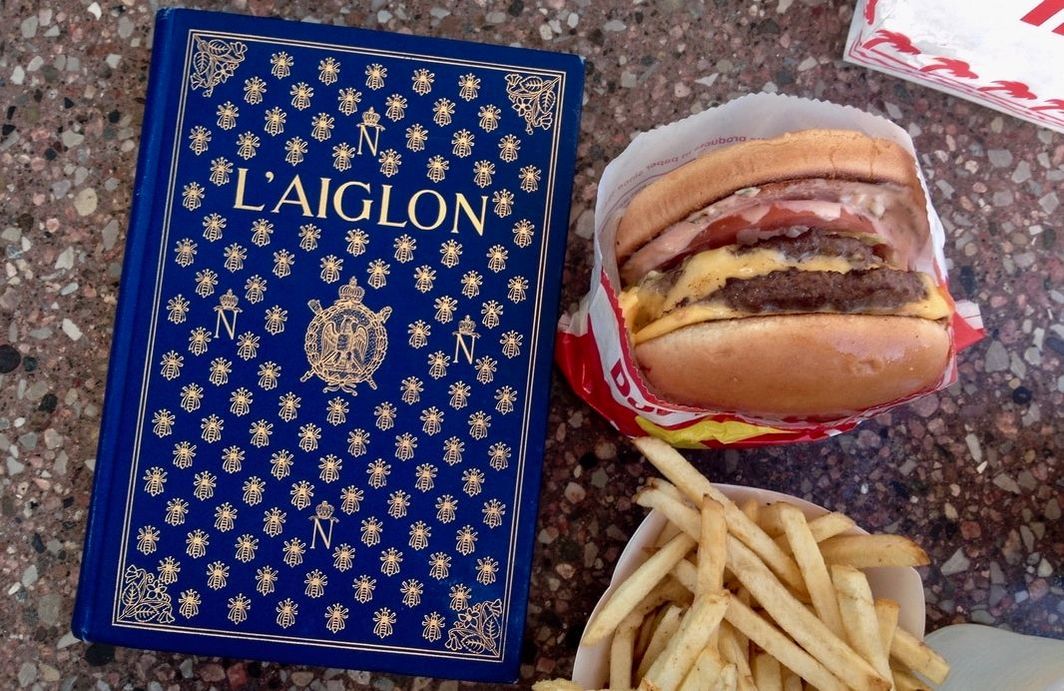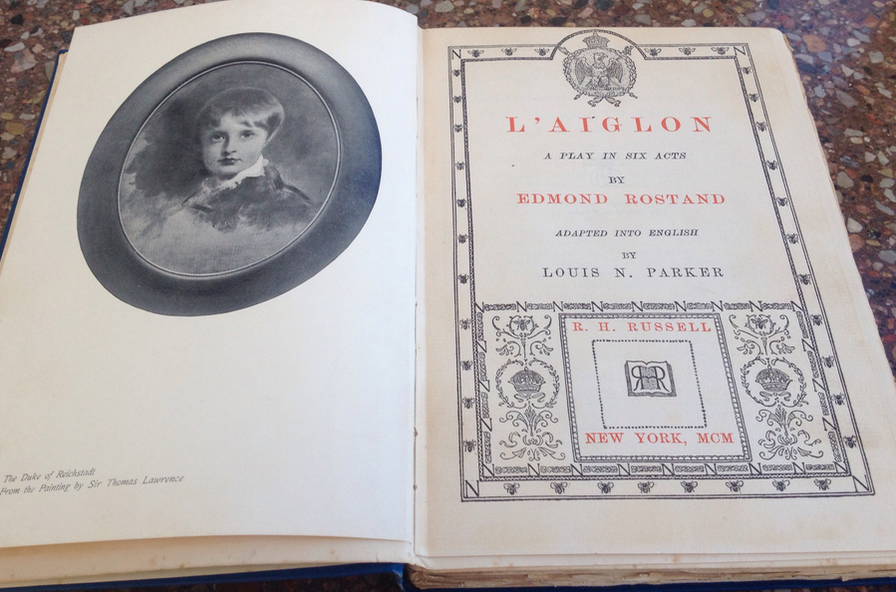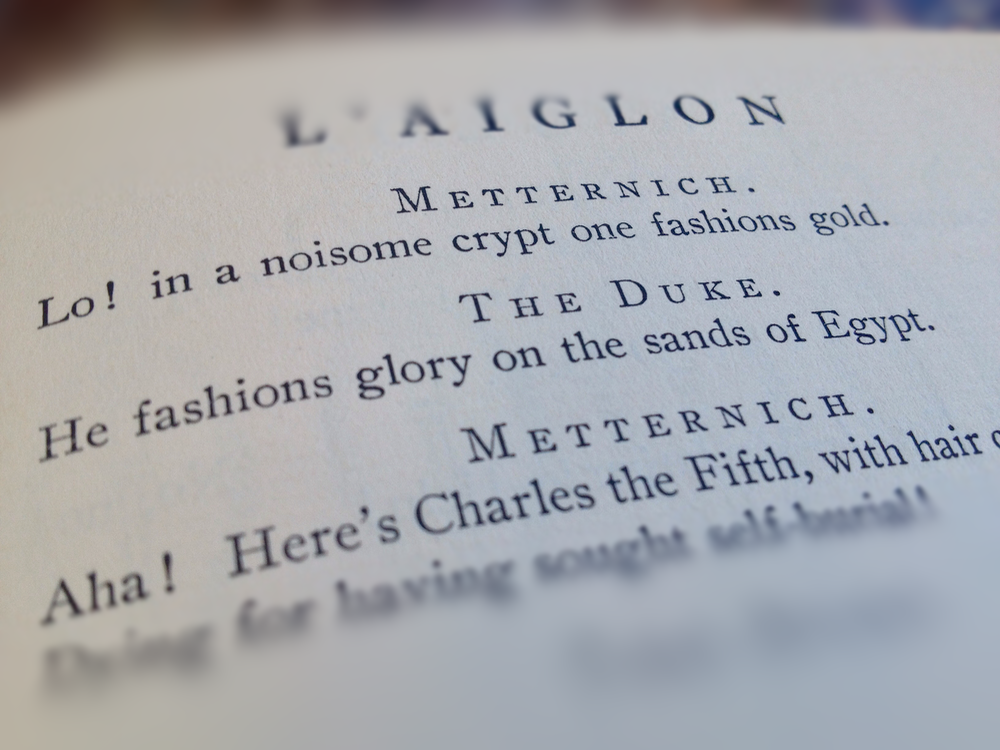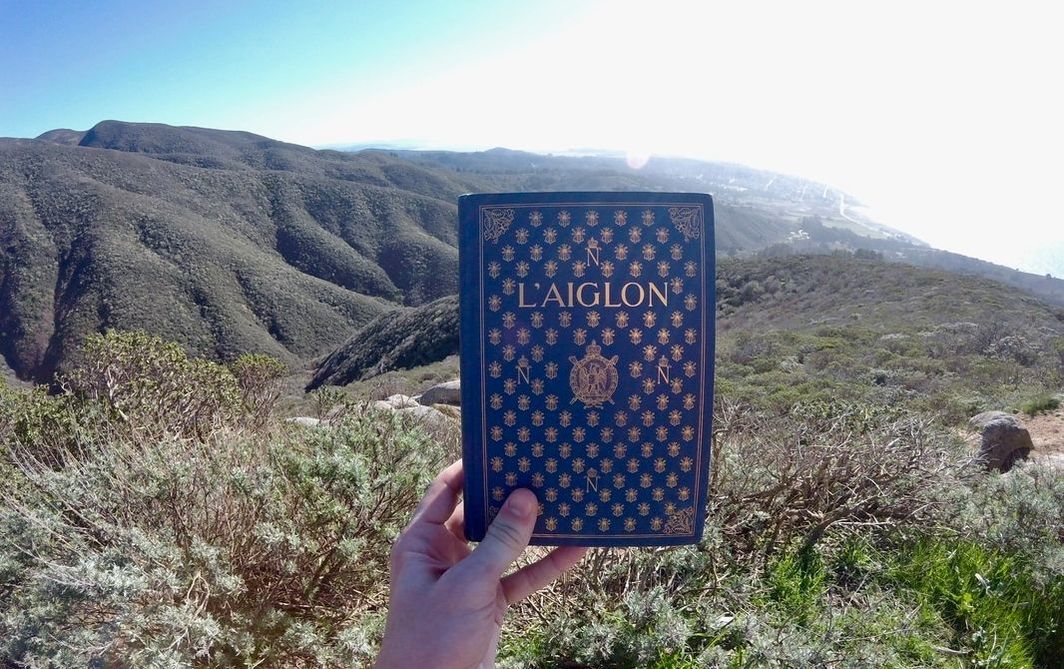In L'Aiglon, meaning 'The Eaglet,' Edmond Rostand reimagines the twenty-first—and final—year of Napoleon II's life. The young man exiled from France for fear of someday inheriting his father's thirst for glory, is raised as 'Franz' in Austria as the Duke of Reichstadt. Moreover he's placed under indefinite house arrest. Both his Austrian title and imprisonment are designed by Klemens von Metternich to strip Francois of his very identity — his past and his future. Indefinitely caged, the Eaglet suffers from a "dull disquiet," as all talk of his father's battlefield glory is outlawed and Napoleonic sympathizers hunted down.
The young man though has found a way to smuggle the truth about his lineage and some hope for his future, past the guards outside his bedroom: each night, Fanny Elssler, feigning as his lover, visits him with a different contraband history book secretly tucked under her dress. Completing it in the early hours of the morning, Franz hides it atop his bed canopy and dreams "beneath the dome of history." It's within those thousands of pages that tell the outlawed, heroic tale of his father's victories in which he "fashion[ed] glory on the sands of Egypt." In his father's past, he begins to imagine what life might be and could be for himself, the Eaglet.
If only he could escape Metternich's cage...
The young man though has found a way to smuggle the truth about his lineage and some hope for his future, past the guards outside his bedroom: each night, Fanny Elssler, feigning as his lover, visits him with a different contraband history book secretly tucked under her dress. Completing it in the early hours of the morning, Franz hides it atop his bed canopy and dreams "beneath the dome of history." It's within those thousands of pages that tell the outlawed, heroic tale of his father's victories in which he "fashion[ed] glory on the sands of Egypt." In his father's past, he begins to imagine what life might be and could be for himself, the Eaglet.
If only he could escape Metternich's cage...
WHY I LOVE IT
The Theme
Like Cyrano de Bergerac and Chantecler, L'Aiglon depicts a hero's quest to realize a distant dream, which ultimately does not come to fruition, and then the hero must act accordingly. All three possess a solemn courage and unblemished integrity to their ideals despite the outcome, that I love in Rostand's work.
Flambeau
On another note, I enjoyed the change of pace from Rostand's more honey-tongued, flamboyant protagonists (Cyrano and Chantecler). The Eaglet's verses are less witty and poetic, but have a sort of directness and youthful angst or even aggression to them. There is an old veteran character, Flambeau (which literally translates to 'flaming torch') who plays the poet, passionately rhapsodizing about Napoleon and defending his son's honor and life in action. Flambeau, despite the warrant for his arrest for being a known sympathizer, has tasked himself for years with guarding the Eaglet's bedroom window every night from possible spies and assassins. The old veteran even goes so far as to sneak inside and paint the young man's toy soldiers in the colors of his father's once-proud and victorious armies.
Autobiographical
Edmond Rostand view himself as similar to the Eaglet. Both were the sons of well known fathers who set such an exacting perfectionism in them. Moreover, while Francois suffered for being the only legitimate (in marriage) son of Napoleon, Rostand was a product of an extra-marital affair, which seemed throughout his life to plague him with feelings of inferiority. Another epic father-figure of Rostand's was the late French novelist Victor Hugo. Rostand saw himself as a creative and aesthetic offspring of Hugo, one dedicated to reviving the fading glory of the French language in verse plays, poetry, and also of depicting romantic, idealistic heroes. {JG}
Like Cyrano de Bergerac and Chantecler, L'Aiglon depicts a hero's quest to realize a distant dream, which ultimately does not come to fruition, and then the hero must act accordingly. All three possess a solemn courage and unblemished integrity to their ideals despite the outcome, that I love in Rostand's work.
Flambeau
On another note, I enjoyed the change of pace from Rostand's more honey-tongued, flamboyant protagonists (Cyrano and Chantecler). The Eaglet's verses are less witty and poetic, but have a sort of directness and youthful angst or even aggression to them. There is an old veteran character, Flambeau (which literally translates to 'flaming torch') who plays the poet, passionately rhapsodizing about Napoleon and defending his son's honor and life in action. Flambeau, despite the warrant for his arrest for being a known sympathizer, has tasked himself for years with guarding the Eaglet's bedroom window every night from possible spies and assassins. The old veteran even goes so far as to sneak inside and paint the young man's toy soldiers in the colors of his father's once-proud and victorious armies.
Autobiographical
Edmond Rostand view himself as similar to the Eaglet. Both were the sons of well known fathers who set such an exacting perfectionism in them. Moreover, while Francois suffered for being the only legitimate (in marriage) son of Napoleon, Rostand was a product of an extra-marital affair, which seemed throughout his life to plague him with feelings of inferiority. Another epic father-figure of Rostand's was the late French novelist Victor Hugo. Rostand saw himself as a creative and aesthetic offspring of Hugo, one dedicated to reviving the fading glory of the French language in verse plays, poetry, and also of depicting romantic, idealistic heroes. {JG}
FAVORITE QUOTES
{ 12 } "It must have looked like a jewel pouring from a wound." — Napoleon II, referring to Flambeau's green and red cross symbol on his uniform
{ 11 } "Books always open where most often read." — The Tailor (37)
{ 10 } "I spend extravagant fortunes in acquiring boredom." — The Tailor (55)
{ 9 } "Upon my father side I am related closely, Sire, to freedom." – Napoleon II (136)
{ 8 } "[Napoleon] fashions glory on the sands of Egypt." — Napoleon II
{ 7 } "Moonbeams shall be my sun..." — Napoleon II, momentarily committing to the life of playboy and not a Caesar
{ 6 } "What could these worms and insects talk about if they had not the eagle to abase?" — Countess Camarata
{ 5 } "To leave her were to cast my soul away!" — Napoleon II, upon hearing the Countess put herself in danger to save him
{ 4 }
"Masked men at the ball: 'Who's your costumer? — Tell us!'
Flambeau, in his Napoleonic war uniform: 'They are ladies — the ancient firm of war and victory, sisters.'" (195)
{ 3 } "It is my failing always to do a little more than necessary!...When I fight, I like to wear a rose tucked behind my ear. It is my luxury!" — Flambeau, the veteran soldier who stands guard outside Napoleon II's bedroom door, and secretly paints Francois' toy soldiers in his father's colors
{ 2 } "Every day a book. Locked safe all night I read it. I was drunk! When it was finished to conceal my crime, I tossed it on the jester's canopy, and there the heap grew; hidden in darkness, I slept beneath a dome of history. All day the heap lay quiet, but at night, when I was sleeping, it began to stir, and from the pages clamorous with battles, the battles issued, stretching torpid wings; and laurels showered upon my slumbering eyes. Austerlitz gleamed among my curtains, Jena glowed in the gilded tassels holden them and on a sudden lapsed into my dream. Till once, when Metternich was gravely telling his version of my father's history, down comes my canopy crushed by the glory; a hundred volumes with their fluttering pages shouting one name!" — Napoleon II (92)
{ 1 }
"The wings which grow
which beat
which open
the wounded wings
the broken wings
the folded wings"
— Rostand's 6 subtitles to the play's 6 Acts, to combat the play from being read in a political perspective
{ 11 } "Books always open where most often read." — The Tailor (37)
{ 10 } "I spend extravagant fortunes in acquiring boredom." — The Tailor (55)
{ 9 } "Upon my father side I am related closely, Sire, to freedom." – Napoleon II (136)
{ 8 } "[Napoleon] fashions glory on the sands of Egypt." — Napoleon II
{ 7 } "Moonbeams shall be my sun..." — Napoleon II, momentarily committing to the life of playboy and not a Caesar
{ 6 } "What could these worms and insects talk about if they had not the eagle to abase?" — Countess Camarata
{ 5 } "To leave her were to cast my soul away!" — Napoleon II, upon hearing the Countess put herself in danger to save him
{ 4 }
"Masked men at the ball: 'Who's your costumer? — Tell us!'
Flambeau, in his Napoleonic war uniform: 'They are ladies — the ancient firm of war and victory, sisters.'" (195)
{ 3 } "It is my failing always to do a little more than necessary!...When I fight, I like to wear a rose tucked behind my ear. It is my luxury!" — Flambeau, the veteran soldier who stands guard outside Napoleon II's bedroom door, and secretly paints Francois' toy soldiers in his father's colors
{ 2 } "Every day a book. Locked safe all night I read it. I was drunk! When it was finished to conceal my crime, I tossed it on the jester's canopy, and there the heap grew; hidden in darkness, I slept beneath a dome of history. All day the heap lay quiet, but at night, when I was sleeping, it began to stir, and from the pages clamorous with battles, the battles issued, stretching torpid wings; and laurels showered upon my slumbering eyes. Austerlitz gleamed among my curtains, Jena glowed in the gilded tassels holden them and on a sudden lapsed into my dream. Till once, when Metternich was gravely telling his version of my father's history, down comes my canopy crushed by the glory; a hundred volumes with their fluttering pages shouting one name!" — Napoleon II (92)
{ 1 }
"The wings which grow
which beat
which open
the wounded wings
the broken wings
the folded wings"
— Rostand's 6 subtitles to the play's 6 Acts, to combat the play from being read in a political perspective
ABOUT THE AUTHOR
Edmond Rostand (1868 - 1918) was a French poet and dramatist, best known for his play Cyrano de Bergerac (1897, my rec here). I've read now his three most famous works, and see in them the author's grand view of life, a focus on the importance of sincerity, and how insincerity, even on a small scale leads to ruin. I love this guy — and Rostand loved Victor Hugo, whose novels are some of my favorites.
I've recently tracked down some of Rostand's earlier works: The Romancers, and The Princess Far Away with plans to report back. If you find a copy of The Red Glove, The Samaritan Woman or his translated poems, please let me know.
I've recently tracked down some of Rostand's earlier works: The Romancers, and The Princess Far Away with plans to report back. If you find a copy of The Red Glove, The Samaritan Woman or his translated poems, please let me know.
YOU MAY ALSO LIKE
{ * } Cyrano de Bergerac by Edmond Rostand
{ * } Chantecler by Edmond Rostand
{ * } Polyeuctus by Pierre Cornielle
{ * } The Best Books I Read In 2016
{ * } Chantecler by Edmond Rostand
{ * } Polyeuctus by Pierre Cornielle
{ * } The Best Books I Read In 2016
This copy was printed in 1900. I'm not sure where it's travelled these past 116 years,
but I'd like to think that both Rostand and the Eaglet would have loved
Montara, CA's big blue sky and rolling green hills.
but I'd like to think that both Rostand and the Eaglet would have loved
Montara, CA's big blue sky and rolling green hills.






















